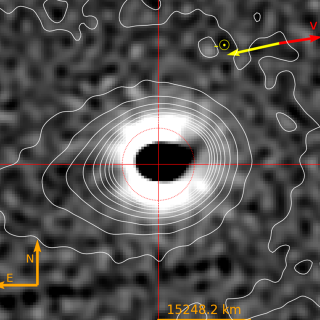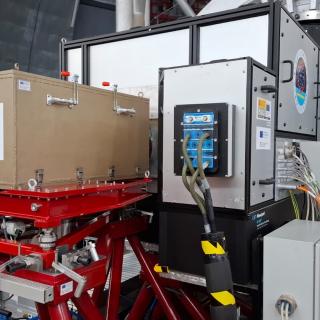It may interest you
-
 The discovery, made in collaboration between the IAC Solar System Group and Light Bridges, reveals the rotation period of comet 3I/ATLAS The Two-metre Twin Telescope (TTT) has made a pioneering discovery in astronomy: the first detection of a jet of gas and dust and its periodic modulation in an interstellar comet, 3I/ATLAS. The study, published in the journal Astronomy & Astrophysics, provides the first evidence of localised activity from an interstellar nucleus, offering unique insight into the nature of a celestial body that formed outside our Solar System. An extraordinarily normalAdvertised on
The discovery, made in collaboration between the IAC Solar System Group and Light Bridges, reveals the rotation period of comet 3I/ATLAS The Two-metre Twin Telescope (TTT) has made a pioneering discovery in astronomy: the first detection of a jet of gas and dust and its periodic modulation in an interstellar comet, 3I/ATLAS. The study, published in the journal Astronomy & Astrophysics, provides the first evidence of localised activity from an interstellar nucleus, offering unique insight into the nature of a celestial body that formed outside our Solar System. An extraordinarily normalAdvertised on -
 The Instituto de Astrofísica de Canarias (IAC) has been honoured with the Canary Islands Diamond Award in the category of Business and Economic Innovation, a distinction granted by Canal 4 Tenerife as part of the first edition of these awards on the occasion of its 30th anniversary. The recognition is bestowed “in acknowledgement of its scientific excellence and its international projection from the Canary Islands” and highlights the IAC’s contribution to the development of a knowledge-based economy in the Archipelago. The IAC was selected as the winner following a jury evaluation processAdvertised on
The Instituto de Astrofísica de Canarias (IAC) has been honoured with the Canary Islands Diamond Award in the category of Business and Economic Innovation, a distinction granted by Canal 4 Tenerife as part of the first edition of these awards on the occasion of its 30th anniversary. The recognition is bestowed “in acknowledgement of its scientific excellence and its international projection from the Canary Islands” and highlights the IAC’s contribution to the development of a knowledge-based economy in the Archipelago. The IAC was selected as the winner following a jury evaluation processAdvertised on -
 During October, the Adaptive Optics System team at the Gran Telescopio Canarias (GTCAO) of the Instituto de Astrofísica de Canarias (IAC), in collaboration with the technical team at the Gran Telescopio Canarias (GTC or Grantecan), successfully completed the integration of the GRANCAIN instrument into the world's largest optical-infrared telescope. The installation was carried out at the GTCAO outlet on the telescope's Nasmyth B platform, a key step in initiating performance testing of the new adaptive optics system. This is the first scientific instrument to operate using the GTC's adaptiveAdvertised on
During October, the Adaptive Optics System team at the Gran Telescopio Canarias (GTCAO) of the Instituto de Astrofísica de Canarias (IAC), in collaboration with the technical team at the Gran Telescopio Canarias (GTC or Grantecan), successfully completed the integration of the GRANCAIN instrument into the world's largest optical-infrared telescope. The installation was carried out at the GTCAO outlet on the telescope's Nasmyth B platform, a key step in initiating performance testing of the new adaptive optics system. This is the first scientific instrument to operate using the GTC's adaptiveAdvertised on
